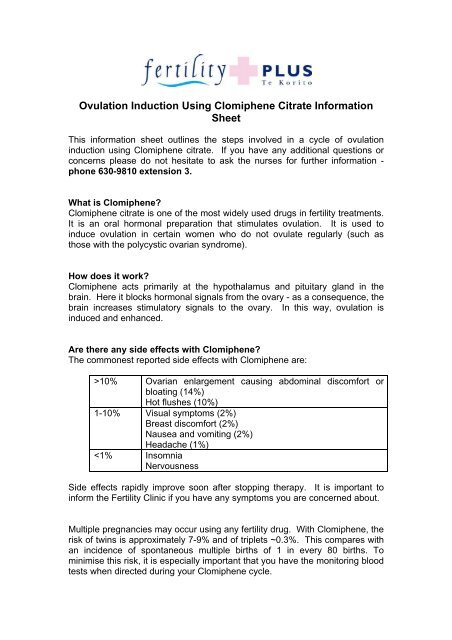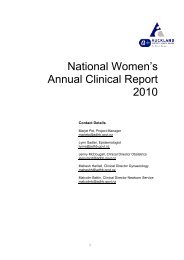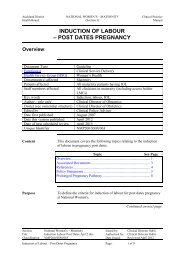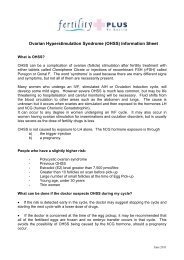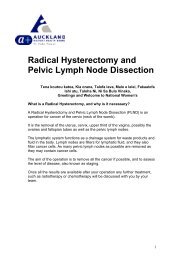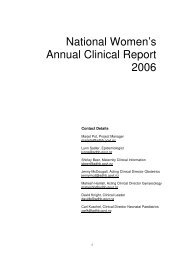Ovulation Induction Using Clomiphene Citrate Information Sheet
Ovulation Induction Using Clomiphene Citrate Information Sheet
Ovulation Induction Using Clomiphene Citrate Information Sheet
You also want an ePaper? Increase the reach of your titles
YUMPU automatically turns print PDFs into web optimized ePapers that Google loves.
<strong>Ovulation</strong> <strong>Induction</strong> <strong>Using</strong> <strong>Clomiphene</strong> <strong>Citrate</strong> <strong>Information</strong><br />
<strong>Sheet</strong><br />
This information sheet outlines the steps involved in a cycle of ovulation<br />
induction using <strong>Clomiphene</strong> citrate. If you have any additional questions or<br />
concerns please do not hesitate to ask the nurses for further information -<br />
phone 630-9810 extension 3.<br />
What is <strong>Clomiphene</strong>?<br />
<strong>Clomiphene</strong> citrate is one of the most widely used drugs in fertility treatments.<br />
It is an oral hormonal preparation that stimulates ovulation. It is used to<br />
induce ovulation in certain women who do not ovulate regularly (such as<br />
those with the polycystic ovarian syndrome).<br />
How does it work?<br />
<strong>Clomiphene</strong> acts primarily at the hypothalamus and pituitary gland in the<br />
brain. Here it blocks hormonal signals from the ovary - as a consequence, the<br />
brain increases stimulatory signals to the ovary. In this way, ovulation is<br />
induced and enhanced.<br />
Are there any side effects with <strong>Clomiphene</strong>?<br />
The commonest reported side effects with <strong>Clomiphene</strong> are:<br />
>10% Ovarian enlargement causing abdominal discomfort or<br />
bloating (14%)<br />
Hot flushes (10%)<br />
1-10% Visual symptoms (2%)<br />
Breast discomfort (2%)<br />
Nausea and vomiting (2%)<br />
Headache (1%)<br />
There is no evidence that <strong>Clomiphene</strong> increases the risk of spontaneous<br />
miscarriage or causes any congenital abnormalities in offspring. Similarly,<br />
short term use of <strong>Clomiphene</strong> is not believed to be associated with any<br />
increased risk of cancer or other health problems in women taking this drug.<br />
How to plan a <strong>Clomiphene</strong> cycle:<br />
1. Phone the nurses on Day 1 of your menstrual period i.e. the first day of a<br />
full menstrual bleed (if this occurs after 12 noon, the next day becomes<br />
Day 1). Women who do not get periods very frequently may have been<br />
asked to do some initial blood tests and/or take a course of Provera to<br />
bring on a withdrawal bleed. The dose of clomiphene you are to take will<br />
be confirmed along with the dates of the monitoring blood tests when you<br />
phone in. Blood forms will be mailed to you if you haven’t already been<br />
given them.<br />
2. Commence <strong>Clomiphene</strong> tablets at the prescribed dose on Day 2 of your<br />
cycle and take them once daily for 5 days.<br />
3. On day 12 of your cycle, please do a blood test to check your estradiol<br />
level. This blood test checks your response to <strong>Clomiphene</strong> and is one way<br />
of monitoring if you are on the correct dose. If this level is very elevated,<br />
you may need an ultrasound scan to check the number of eggs that are<br />
developing – in the event that a large number of eggs are developing the<br />
risk of multiple pregnancy may be high and you may be asked to abstain<br />
from sexual intercourse or use condoms. Please phone the nurses the<br />
next day for your result – they will let you know if a scan is required.<br />
4. Midcycle (day 14 of cycle) is the usual day of ovulation and best time to<br />
have sex (but may vary by a few days from cycle to cycle).<br />
5. On day 21 of your cycle, please do a blood test to check your<br />
progesterone level which will confirm if ovulation has occurred or not. You<br />
may phone the nurse the next day for your result.<br />
6. Once the blood tests are completed the results are reviewed by the doctor<br />
and the <strong>Clomiphene</strong> dose may be altered for subsequent cycles if you do<br />
not conceive. If your period is late please call the clinic so we can arrange<br />
a pregnancy blood test for you. If you do get a period, please call the<br />
clinic if you wish to start another <strong>Clomiphene</strong> cycle.<br />
How to plan a <strong>Clomiphene</strong> cycle with enhanced monitoring:<br />
Some women have very irregular cycles or varied responses to <strong>Clomiphene</strong>.<br />
In these situations we may recommend a cycle with enhanced monitoring.<br />
<strong>Clomiphene</strong> is taken in the same way from days 2-6 of your cycle but more<br />
frequent blood tests and scans are performed to get a better understanding of<br />
when or if ovulation is occurring. The clinic will inform you if they feel you
need this level of monitoring (based on your history or previous responses to<br />
<strong>Clomiphene</strong>).<br />
Additional notes<br />
<strong>Clomiphene</strong> is usually initially begun in a dose of 50mg/day. Women differ<br />
however in their response and so the dose may be increased (or<br />
occasionally decreased) in 25-50mg increments on subsequent cycles<br />
depending upon the results of the monitoring.<br />
All blood tests are carried out at Diagnostic Medlab. We prefer you to do<br />
blood tests first thing in the morning using the priority blood form, as this<br />
allows us to receive the result that afternoon.<br />
~80% of women ovulate in response to <strong>Clomiphene</strong> and 40% conceive.<br />
15-20% of women are “resistant” to <strong>Clomiphene</strong> i.e. they fail to ovulate in<br />
response to increasing doses of <strong>Clomiphene</strong>. For these reasons, it is<br />
important that you have regular reviews every 3-4 months with your Doctor<br />
to determine if you should continue with <strong>Clomiphene</strong> therapy or if any<br />
additional investigations are required.<br />
Costs<br />
<strong>Ovulation</strong> induction with <strong>Clomiphene</strong> is not a government funded<br />
treatment, so there are charges to cover the cost of blood tests, scans and<br />
interpretation of results, as follows:<br />
o $55/cycle for each <strong>Clomiphene</strong> cycle<br />
o $50 extra if a scan is required<br />
o $200/cycle for a <strong>Clomiphene</strong> cycle with enhanced monitoring<br />
You will be invoiced for your treatment when you phone in on Day 1


